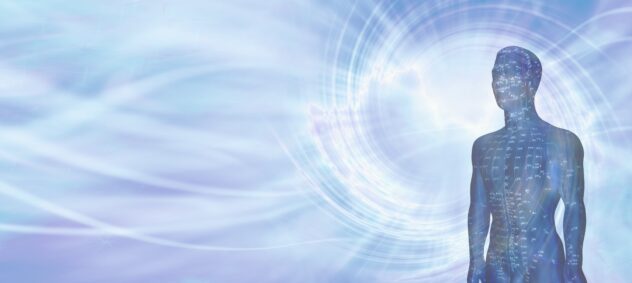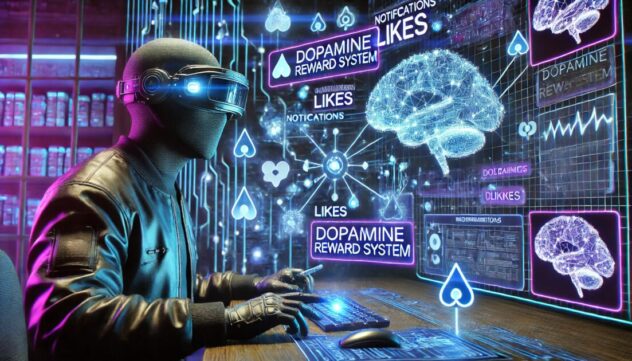
Blue Light Exposure in Neurodivergent Individuals Impacts Sleep and Focus
Many of us know that the blue light from our screens can mess with our sleep, but did you know it can hit even harder for neurodivergent individuals? If someone has ADHD, autism, or other conditions, blue light might mess up their sleep even more and make focusing tougher. This can throw off their daily routines, leaving them feeling extra tired and less able to get things done.
Research shows that blue light can cut down melatonin (the sleep hormone) by as much as 23%, which makes falling asleep even harder. But don’t worry there are easy ways to help manage this! Let’s dive into how blue light affects neurodivergent brains and talk about some simple tricks to boost focus and improve sleep.
Sensory Sensitivities to Blue Light in Neurodivergent Individuals
For many neurodivergent individuals such as those with ADHD, autism, or heightened sensory processing, light can lead to sensory overload. Blue light from screens?
Unlock peak brain performance with science-backed biohacks. Join free now & get your guide for just £4.99 (45% off)!

That’s the real troublemaker. While some might find it easy to ignore, for neurodivergent individuals, blue light can feel overwhelming, almost like a spotlight.
It’s excessively bright and can cause discomfort, leading to challenges in focusing and relaxing. Symptoms like headaches, eye strain, or feelings of restlessness can become more pronounced.
Impact of Blue Light on Circadian Rhythms in Neurodivergent Individuals
The body’s internal clock, or circadian rhythm, keeps us in sync, letting us know when to feel sleepy or awake. Normally, when it gets dark, melatonin, the sleep hormone, kicks in. But blue light from screens can mess that up, and for neurodivergent individuals who are extra sensitive, it can be even worse.
Blue light can delay melatonin even more for them, making it harder to fall asleep on time. This throws off their sleep cycle, leaving them tired during the day and wide awake at night. It’s not just about staying up late, it can lead to sleep disorders like insomnia, which are already common in neurodivergent individuals.
What makes it tougher is that many neurodivergent individuals rely on screens to focus or relax, especially in the evening. This creates a cycle where blue light keeps disrupting their sleep, making it harder to get back on track. Cutting down blue light exposure in the evenings, with filters or less screen time, can help reset their rhythm.
Melatonin Production and Sleep Quality in Neurodivergent Individuals
For neurodivergent individuals, blue light can be a real sleep disruptor, starting with melatonin. Melatonin is a hormone that tells your body it’s time to sleep, and it’s usually triggered by darkness.
But when you’re exposed to blue light, especially from screens, melatonin production can slow down or even stop altogether. This hits neurodivergent individuals harder because their bodies may already have trouble with regulating sleep.
ADHD or autism often deal with more intense sleep challenges, and blue light exposure only makes things worse. The more blue light they’re exposed to in the evening, the more their sleep quality takes a hit.
It’s harder for their brains to wind down and prepare for sleep, which can lead to restless nights or even feeling wide awake when they should be tired. This lack of proper sleep can affect everything from mood to focus the next day.
Blue Light’s Role in Sleep Disorders Among Neurodivergent Individuals
For individuals with conditions like ADHD or autism, sometimes their internal body clock can be easily thrown off, and exposure to blue light late in the day makes it even worse. Blue light tricks the brain into thinking it’s still daytime, delaying the release of melatonin and pushing back the natural sleep cycle.
This can lead to what’s known as sleep phase delay, where a person’s bedtime gets pushed later and later, causing them to stay up into the night and feel groggy during the day.
On top of that, neurodivergent individuals are more likely to deal with insomnia, where they have trouble falling asleep or staying asleep. Blue light makes it harder for their brains to switch off at night, leading to a vicious cycle of poor sleep.
Focus and Attention Issues in Neurodivergent Individuals Due to Blue Light

Blue light doesn’t just mess with sleep, it can cause more trouble! For neurodivergent individuals, like those with ADHD or autism, blue light can be overstimulating, making it even harder to concentrate.
They often have heightened sensory awareness, so long screen time can feel overwhelming. It cranks up distractions, pulling their mind in every direction. For someone with ADHD, blue light turns their natural thought-jumping into a full-on race, making it tough to focus on one thing.
For those with autism, sometimes the overload from blue light can cause serious discomfort, making it almost impossible to stay calm and concentrate. It’s like their brain is fighting to keep up, but blue light keeps throwing them off balance. Getting tasks done? Much harder when blue light is in the mix.
Cognitive Functioning and Learning in Neurodivergent Individuals Under Blue Light Exposure
Too much blue light can really mess with learning and memory, especially for neurodivergent individuals. They’re already handling unique ways of processing info, and blue light just makes it harder.
When exposed to blue light for too long, the brain gets overloaded. This makes it tough to remember what they’ve learned.
For someone with ADHD, blue light cranks up the overstimulation, making it hard to focus on new information and even harder to recall it later. For those with autism, the sensory overload from blue light can feel overwhelming, making it harder to take in and hold onto details.
All this adds to their mental workload, forcing their brains to work overtime just to keep up. It’s draining and leaves them feeling wiped out.
Herbal Biohacks to Reduce Blue Light Exposure for Neurodivergent Individuals
Luckily, alongside technological solutions like screen filters and reduced screen time, natural, herbal remedies can help mitigate the effects of blue light exposure.
1. Lutein and Zeaxanthin: Protecting the Eyes from Blue Light
Lutein and zeaxanthin might sound fancy, but they’re just natural compounds found in plants that help protect your eyes from blue light.
They work like a shield, soaking up blue light before it hits your eyes. Research has shown that these compounds can reduce eye strain and improve vision for individuals exposed to blue light for long periods. You can find these in leafy greens like spinach and kale, or even grab a supplement if you want an easy option.
For neurodivergent folks who spend a lot of time on screens, these could help reduce some of that annoying eye discomfort that comes with staring at your phone or computer all day.
2. Ashwagandha: Reducing Stress and Sensory Overload
Ashwagandha is a pretty popular herb that’s known for helping with stress. If blue light is making you feel extra anxious or overstimulated, ashwagandha might be just what you need to calm down.
Neurodivergent individuals are often more sensitive to stimuli. This herb can help regulate your stress levels and stop blue light from making you feel overwhelmed.
There’s research showing that ashwagandha can lower anxiety and stress, which could make a big difference when blue light starts pushing your sensory overload to the max. You can take it as a supplement or find it in herbal teas.
3. Chamomile: Supporting Better Sleep After Blue Light Exposure
Chamomile is that classic “chill out” tea, and it’s great for helping with sleep, especially when blue light is messing with your ability to doze off.
Blue light can delay the release of melatonin, the hormone that tells your body it’s time to sleep. Chamomile contains an antioxidant called apigenin, which helps your brain relax and get ready for bed.
Studies have found that chamomile can actually improve sleep quality, so drinking a cup of chamomile tea in the evening could help counter all that screen time and make it easier to fall asleep.
4. Bilberry: Eye Health and Blue Light Protection
Bilberry might not be the most well-known fruit, but it’s packed with antioxidants that are great for your eyes. The antioxidants in bilberry, called anthocyanins, help improve blood flow to your eyes and protect them from blue light.
There’s research showing that bilberry extract can even reduce the damage blue light causes to the retina, which is the part of your eye that processes light.
5. Valerian Root: Calming Effects for Improved Focus
Valerian root is usually known for helping with sleep, but it’s also great for calming the mind and improving focus. If you’re neurodivergent, you might find it hard to concentrate after too much screen time. Valerian root could help settle that overstimulation in your brain.
It’s been shown to help individuals with ADHD by reducing hyperactivity, making it easier to stay on task.
Natural Lifestyle Modifications for Neurodivergent Individuals to Combat Blue Light Effects
Blue light exposure can occasionally become a real struggle for neurodivergent individuals. But making some simple lifestyle tweaks can go a long way in managing its impact. Creating a more neurodivergent-friendly environment starts with small changes.
Start by reducing blue light at home. Use warm lighting, add blue light filters to your devices, and take regular breaks from screens to give your eyes and brain a rest.
Interested in another way to tackle light-related challenges? Check out our Virtual Reality for Seasonal Affective Disorder article to learn how VR can brighten your mood and improve mental well-being, especially during the darker months of the year. It’s another innovative tool to add to your wellness arsenal.
The Bottom Line
Besides slapping on a blue light filter and cutting back on screen time, nature’s got your back! Herbs like lutein, chamomile, and ashwagandha are absolute game-changers for calming sensory overload, improving focus, and helping you sleep like a baby.
A little tweak to your routine, like sneaking in more movement and loading up on blue light-busting foods (hello, spinach, kale, and cherries!), can work wonders, too.
But here’s a total game-changer most individuals miss: sunlight! Yep, just 10-15 minutes outside can reset your body’s clock and kick those blue light blues to the curb. Easy peasy, right?
This simple routine can make it easier to wind down at night. It also reduces the risk of sleep disorders like insomnia or delayed sleep phase.
Blue light might be making it harder for you to focus, sleep, or just feel calm. Try adding one or two of these strategies into your daily life and see how they work for you.
So, are you ready to take control of your screen time? Start small, be consistent, and notice the difference it makes in your overall well-being!
Join the Herbal Biohacker Community
At Herbal Biohacker, we’re passionate about uncovering natural solutions to support neurodivergent and neurotypical minds alike. Join our community to share your journey, gain insights, and discover more tools for thriving naturally.






